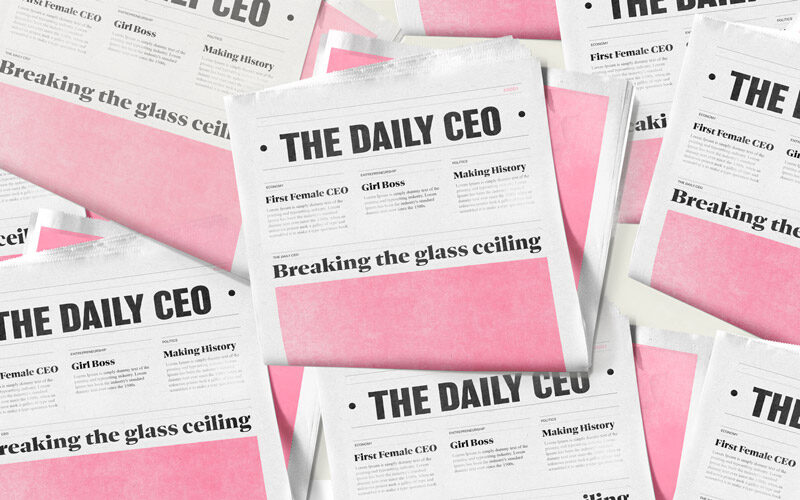In 2022, fourth-wave feminism is in full swing. As the venture capital stats as well as gender pay gap data shows, the fight continues. In most modern workplaces, it’s no longer expected or tolerated for a woman to be shunned, patronised, or ignored.
So why is mass media getting away with it?
Even respectable news sources continue to portray women in leadership roles as tokens. It’s all in the vernacular: men are ‘successful’ and ‘accomplished’, while women are ‘strong’ and ‘ambitious’.
The adjectives aren’t inherently bad, but they’re part of a larger narrative.
And when the media only tells part of the story, it doesn’t just impact how people see women – it impacts equality on a systemic level.
The stock market study
Last year, the Kellogg School of Management at Northwestern University unveiled some pretty damning stats. A study analysed media coverage from 17,000 outlets between 2000 and 2016, aiming to take that reporting and compare it to market fluctuations.
What they found was revealing:
- When a female CEO from a U.S. publicly traded firm was given media attention, stocks for that firm dropped by 2-3% on average.
- If a male CEO was in the news, there was no significant change to stock prices.
- When a female CEO received little to no media attention, there was actually a slight uptick in stock prices.
But according to the Rockefeller Foundation, 96% of people believe that men and women are equally capable of being successful in business.
If the sexism is no longer extending to Joe Public, why is the media’s portrayal of female CEOs having such a negative impact on the stock market?
The study’s authors believe it has to do with something called second-order sensemaking. This is where traders predict the reactions that other traders might have to certain pieces of news, and then make their own decisions accordingly. It’s likely got nothing to do with anyone’s real opinions of women in power.
This way of operating is almost paradoxical, and it can be traced back to a systemic issue – the language we use and the stories we tell about women in leadership roles.
Death of the CEO-ess
There’s a glaring difference between the way news outlets praise men and women. Women are revered, elevated, and congratulated based on their gender, as if their achievements were made in spite of their perceived shortcomings. Men are simply tied to their merit.
Other insights from the Rockefeller Foundation tell us that:
- Based on the analysis of 20 outlets, 49% of articles about female CEOs mentioned gender, while only 4% of articles about male CEOs did the same
- 70% of articles for female CEOs mentioned family, compared to 0% of articles for male CEOs
- 80% of crises are blamed on female CEOs, which is 2.5 times higher than the rate for male CEOs.
The media is still pumping out a narrative that focuses on gender and family life, rather than ability or business acumen. It’s as if women “out of the home” are still an anomaly. It implies women are only in their roles because of affirmative action, or because they’re “not like other girls”.
Dad of eight Elon Musk
When we think about the language used in most other industries, we recognise we’re past policewomen and poetesses. We don’t refer to secretaries as ‘girl Fridays’. So why is it that in 2022, the most common thing said about a female CEO is that she’s a “female CEO”?
And the aggressions aren’t always so subtle. When News.com.au covered the $140 million acquisition of Modibodi, a clothing brand designed to prevent menstrual leaks, the article was entitled: “Aussie’s gross idea bought for $140m”.
In 2022, periods are apparently still “gross” – an embarrassing female bodily function that should be swept under the carpet. It was only changed after some well-deserved Twitter backlash.
What unfortunately wasn’t changed was the paragraph: “Modibodi was founded by Sydney mum-of-four Kristy Chong in 2013, and it now has 45 employees operating out of its Sydney headquarters.”
Chong being a mother perhaps becomes more relevant when she speaks about her brand origins, but have you ever heard Elon Musk referred to as a “dad of eight” – which is arguably a hell of a lot more newsworthy – three sentences into an article? Or ever?
Almost half of all families have two working parents, which means there are a lot of working dads out there, and presumably a lot of CEO-dads. But the declaration of parental status is reserved only for women.
These are the words that weave a patronising story: women in power have somehow, painstakingly, fought their way to the top against all the odds being a woman presents.
A better focus
We’re a way off true equality in business. There are numerous factors at play making it harder for women to get their voices heard and their businesses off the ground.
The media perpetuates a vicious cycle, and it’s almost comical to learn that the people editing our daily news snippets are mostly male. Only 21% of the top 179 editors are women.
Why does that statistic matter, when roughly 40% of journalists are women? Because editors are the ones who green-light stories, choose the headlines, and have the final say in what goes to print.
It’s not hard to see how this lack of diversity can quickly lead to a biased portrayal of women – both in terms of quantity (the number of stories being run) as well as quality (the way those stories are being told).
If the perception of women in leadership is to ever change, the media has an important role to play.
First and foremost, we need more women in editorial positions, and we need conscious men who actively write against the grain to help create a more progressive landscape. But it doesn’t stop there. Even if the people approving the stories are diverse, that won’t make a difference if the reporters themselves aren’t approaching their subjects with an open mind.
It’s also crucial that we see a wider variety of female leaders portrayed in the media. We’re used to seeing women CEOs being interviewed about their “secrets to success” – but what about everyday female managers? What about small business owners who aren’t defined as solely “stay-at-home mums” or “working women”?
The goal should be to normalise the idea of women in positions of power, regardless of industry. If we can see more relatable examples of female leadership, it’ll become less foreign – and therefore less intimidating – for the next generation of women looking to enter the workforce.











